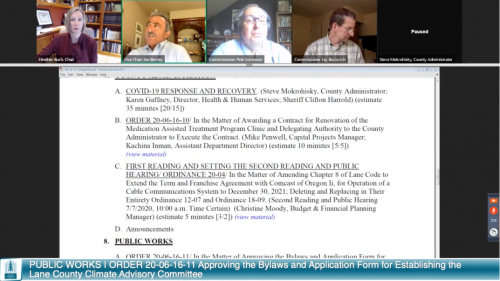
The Lane County Board of County Commissioners voted 4-1 to approve the bylaws of the Climate Advisory Committee during the afternoon session of their June 16 meeting.
Back in February, the Board of County Commissioners had passed a resolution allowing for the creation of a countywide climate action plan and a committee that provides recommendations to the board on climate action. According to the county’s meeting documents, the Climate Advisory Committee’s recommendations and outreach will help the county make climate change-related decisions that incorporate lived experiences since the committee will include people with diverse backgrounds.
Commissioner Jay Bozievich voted against the Climate Advisory Committee bylaws, saying he had also dissented at the budget committee’s hearing of funding the committee. He said the money going toward the committee would be better off going to the Sheriff’s Office. Bozievich made the comment at a time when many are calling to defund the police as Black Lives Matter protests take place across the country.
“It’s political,” he said of the new committee. “It’s basically a waste of county resources.”
Bozievich, an engineer, has in the past directed climate activists to consider reading news from climate change denial websites like Natural News.
“Per capita footprint in Oregon is below the national average,” Boz said.
He added that the U.S. has reduced its carbon footprint since the 1980s, but pointed to China as the greenhouse gas giant.
“China’s has quadrupled per capita,” he said. “Everybody is concerned about the impacts of climate change on the poor, minorities and underrepresented communities. Yet no one is ever concerned about some of the actions being taken to combat climate change.”
The likelihood of the committee getting entrenched with climate politics was a concern of commissioners Joe Berney and Pat Farr, too.
But those two commissioners wondered how to get the committee focused on climate science rather than political bickering.
In his address to commissioners, Mark Nystrom, the county’s climate strategist, said the committee has reserved seats for certain demographics in an attempt to capture proper representation.
The committee has seats for underrepresented populations (like LGBTQ community, racial and ethnic minorities), rural and metro residents, tribal government representatives, youth, representatives from major employers, industries, small businesses and people with a background in physical and climate science. The committee can’t have fewer than three members from outside of the Eugene-Springfield area to ensure regional diversity, according to board documents.
Commissioners will each appoint one member. The board chair will also appoint a county commissioner to serve on the committee. Five other members will be considered at-large and will be appointed by commissioners following staff recommendations. The committee will have seven to 11 members.
Nystrom said county staff wants to ensure there’s representation from the larger companies in the area. And if there isn’t that interest, the county would do a better job connecting with local chambers of commerce to recruit businesses.
According to the county’s board documents, the committee members could be voted on by commissioners by October this year. The county is also working with The Good Company to develop a climate action plan for the county’s internal operations and create a countywide greenhouse gas emissions inventory.